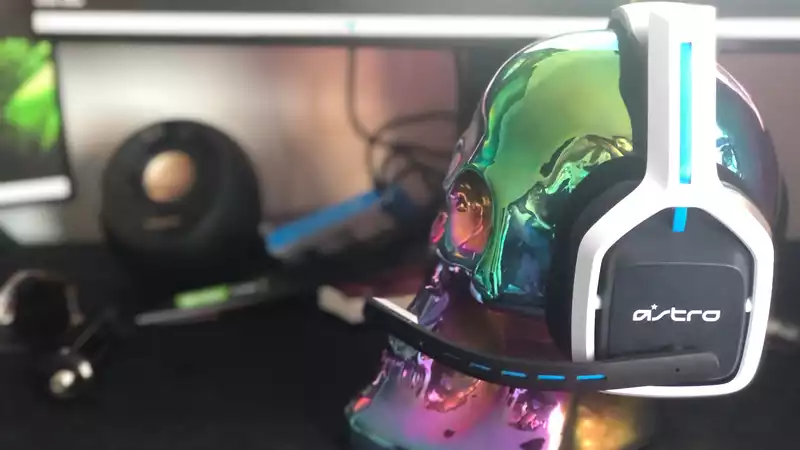The Astro A20 wireless gaming headset addresses a problem we're too embarrassed to talk about. We're talking about too many headsets.
Before I made a living reviewing headsets, I was known for rotating between three to five headsets for daily work and gaming. One pair for working out, a pair of noise-canceling headphones to drown out my coworkers in New York City, one with a good microphone for online gaming and another for just listening to music, or a wireless one for gaming while standing at my desk. I'm willing to admit that I have issues with headphones, and I needed something that would accommodate all possibilities. I'm working every day to reduce those 3-5 to 1-3. It was... It was a process.
Like many PC gamers, I own both an Xbox One X and a Playstation Pro, and will be upgrading both to next-generation consoles later this year. I know the headaches of the multiple headset lifestyle, and the Astro A20s seeks to simplify the lives of multi-headset gamers around the world by offering one headset for all three platforms. Wild, right?
If you've ever owned a wireless PC gaming headset or bought a headset, you'll notice that the headset is either for PC/Xbox or PC/PS, but not for all three platforms. This is because the firmware for the Xbox and PlayStation consoles is different.
Many of us would buy a second headphone for the console out of this equation, which would be quite expensive; Astro found a novel solution when designing the Astro A20: instead of putting the firmware in the headset itself, Gen 2 USB transmitters are specific to each gaming console. In layman's terms, all you need to do to use the headset with your PC and each console is pick up this $20 dongle and pair it with your headset.
Unfortunately, it will be another month or so before the new consoles are available, so I can't yet test the cross-compatibility claims. What I can talk about is the most important part of the setup: how it works on a PC.
The $120 price tag is attractive for a wireless gaming headset that works with all gaming consoles, and the A20s retain the typical Astro aesthetic with square ear cups. The white design with blue accents (green on the Xbox) gives the headset a light, playful feel. And speaking of lightness, the headset weighs just under 12 ounces (317 g), which makes sense considering the whole thing is a mix of hard plastic and rubber.
The A20s are very comfortable, thanks to the soft fabric ear cups and plastic frame, and can be worn on the head for long periods of time without discomfort, and feel quite comfortable even with glasses on.
The right ear cup has controls consisting of a volume knob, EQ, and a power button The EQ switches between three sound presets: Pro, Studio, and Astro The Pro has a more balanced sound, while the Astro emphasizes bass and is great for bass-heavy music or giving explosions a kick; Studio is great for watching movies if you want a more accurate sound.
I've been playing too much "Star Wars: Squadrons" lately, and the A20s tickled my geek heart with their ability to reproduce the sound of lasers firing from the X-wings and the whine of the TIE Interceptor's full-power engines. Gaming audio did not disappoint either, with this headset providing adequate bass for music.
The microphone, on the other hand, is not so great. As you can hear in the recording above, there is a slight hiss; while playing Star Wars: Squadrons, my teammates repeatedly complained that they could not hear me clearly and that I sounded distant.
The Astro A20s promises at least 15 hours of battery life, which is about right in my usage and on par with similarly priced headsets. Auto shutdown is a nice feature, turning the headset off after 10 minutes of inactivity to conserve battery power; the A20s charges via USB-C, which is something more headsets should do (the less micro USB, the better).
I was very surprised by Astro's consumer-friendly solution to a problem I've had for years: wireless gaming headsets that work with PC, Xbox Series X, and PS5 are kind of a big deal. When I get a new gaming console, I will try the A20s again. Even if I don't buy a next-gen console anytime soon, it's nice to know that the only thing I might need is a $20 dongle.
I wasn't crazy about the microphone, but the Astro A20s still provides a comfortable and good sounding listening experience for under $130.
.

Comments